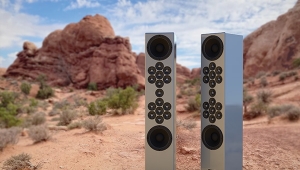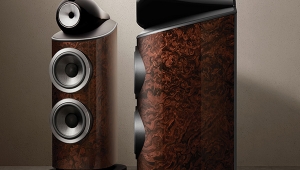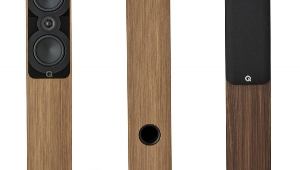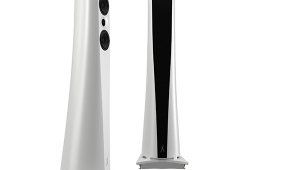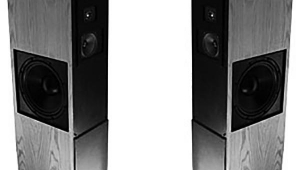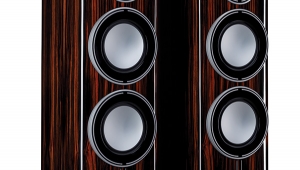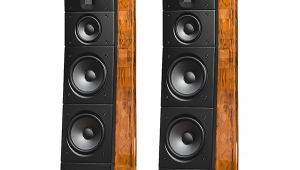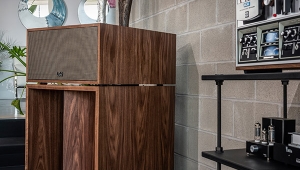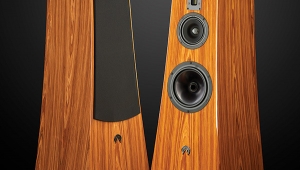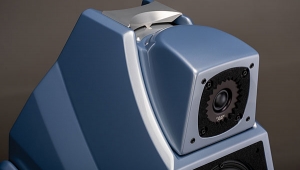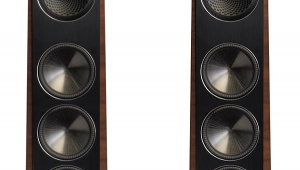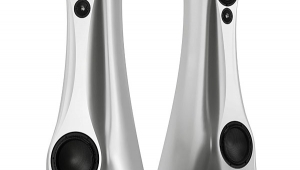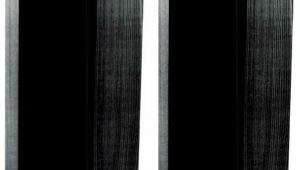| Columns Retired Columns & Blogs |
Gradient Helsinki 1.5 loudspeaker Page 3
I'd never before heard anything like it. Over the years, the spatial performance of my favorite speakers has been such that a very good sense of scale is implied, but that has always required either a physically large speaker or some assistance from room boundaries—either of which produces the sorts of reflections and delays that help one believe one is hearing something big. The Gradient Helsinkis approached scale in a different and remarkable way. Examples abounded, but my favorite was while listening to the Andante of Mozart's Symphony 38, K.504 ("Prague"), played by Colin Davis and the English Chamber Orchestra (LP, L'Oiseau-Lyre SOL 266). That not only showed the Helsinkis' spatial qualities at their best, but also their fine sense of melodic flow.
Equally impressive were other qualities that I wouldn't have expected to arise from the Helsinkis' design imperative of room independence (but, again, who knows?). Certain instruments—woodwinds in particular—sounded timbrally sweet and right to a remarkable extent. Nuances of playing were often laid bare as if for the first time, including mistakes (or, as we call them in bluegrass for some unknown and doubtless appalling reason, clams). An acoustic guitar in CSNY's "Ohio," from Neil Young's Greatest Hits (LP, Reprise/Classic 48935-1), was chorded with an unexpectedly nuanced rhythm. During "The Lamia," from Genesis's The Lamb Lies Down on Broadway (LP, Atco SD 2-401 0998), I was held rapt by the subtle engineering effects that were added to certain lines—even individual words. When Peter Gabriel sings "warm breeze," it sounded as though a number of unused mikes had been briefly opened up to produce a remarkable effect. And I heard subtle keyboard glissandi—"siren" sounds in a song about sirens of a different sort—that I'd never before noticed.
Then again, "The Lamia" highlighted the fact that the Gradient's bass level was not at all satisfying or sufficient. A series of very deep bass-pedal notes follow the main portion of each double verse; not only did the Helsinki entirely miss the fundamental of the second note (D), it so clearly reproduced one of that note's less obviously expected harmonics that the effect was jarring.
The Helsinki 1.5 was a little more power-hungry than the loudspeakers I'm accustomed to. Given the Gradients' very good way with natural sonic textures, I looked forward to using them with my Shindo Corton-Charlemagne amplifiers, which excel at same. The pairing sounded lovely on small-scale music, but the grandeur and ease of orchestral music, not to mention good recordings of piano music, required the more powerful amps in my home: the PrimaLuna DiaLogue Seven and Electrocompaniet AW400 monoblocks.
As well as the Gradient Helsinki 1.5s suited stereo recordings, and as textured and substantive as their sound was, I found myself wanting still more body and presence when listening to great mono recordings. And while I'm open to the possibility that that body and presence, and perhaps others of the qualities I seek, are in fact distortions—the likes of which the Helsinkis effectively banished—I'm neither convinced of that argument nor, in any event, wholly swayed. But that's just me.
Conclusions
Gradient describes their latest loudspeaker as room-independent. Well, yes and no: yes in the sense that, when optimized, it performs in such a manner that the room contributes far less to the sound output than it does with most other speakers; but no in the sense that, to achieve such an optimum, one must take tremendous pains in selecting the Helsinkis' positions within that room.
This is a challenging loudspeaker. It asks of its owner a certain level of effort—I never did get quite the bass performance I would want from a loudspeaker that takes up this much room, nor did I ever shake the notion that it's needlessly hampered in that regard by the fixed 90° angle between its woofer and its other drivers—not to mention a certain level of open-mindedness. If the success of a perfectionist audio component can be measured by the extent to which it rewards such things, the Helsinki 1.5 deserves high praise indeed.
The Gradient Helsinki 1.5 is a remarkable product whose execution seems to lag only slightly behind its conception—and its conception is both original and, in its way, ingenious. Though I was skeptical at first, I came away thinking that the Helsinki 1.5 is a must-hear for anyone with a taste for hi-fi adventure, and quite possibly a must-own for anyone for whom clarity of presence can tip the scale toward ecstasy.
- Log in or register to post comments
